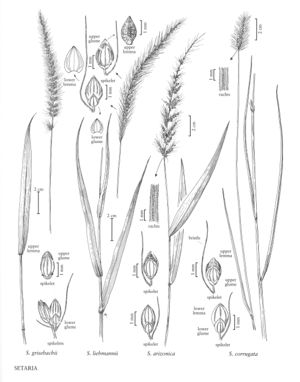Difference between revisions of "Setaria grisebachii"
FNA>Volume Importer |
imported>Volume Importer |
||
| Line 39: | Line 39: | ||
|publication year= | |publication year= | ||
|special status= | |special status= | ||
| − | |source xml=https:// | + | |source xml=https://bibilujan@bitbucket.org/aafc-mbb/fna-data-curation.git/src/bb6b7e3a7de7d3b7888a1ad48c7fd8f5c722d8d6/coarse_grained_fna_xml/V25/V25_1410.xml |
|subfamily=Poaceae subfam. Panicoideae | |subfamily=Poaceae subfam. Panicoideae | ||
|tribe=Poaceae tribe Paniceae | |tribe=Poaceae tribe Paniceae | ||
Revision as of 22:01, 27 May 2020
Plants annual. Culms 30-100 cm; nodes pubescent, hairs appressed. Sheaths with ciliate margins; ligules ciliate; blades to 12(25) cm long, to 10(20) mm wide, flat, hispid on both surfaces. Panicles 3-18 cm, loosely spicate, interrupted, often purple; rachises hispid; bristles 1-3, 5-15 mm, flexible, antrorsely scabrous. Spikelets 1.5-2.2 mm. Lower glumes about 1/3 as long as the spikelets, distinctly 3-veined, lateral veins coalescing with the central veins below the apices; upper glumes nearly equaling the upper lemmas, obtuse, 5-veined; lower lemmas equaling the upper lemmas; lower paleas about 1/3 as long as the lower lemmas, narrow; upper lemmas finely and transversely rugose; upper paleas similar to the upper lemmas. 2n = unknown.
Distribution
Md., Ariz., Okla., N.Mex., Tex.
Discussion
Setaria grisebachii is the most widespread and abundant native annual species of Setaria in the south-western United States. It grows in open ground and extends along the central highlands of Mexico to Guatemala, usually at elevations of 750-2500 m. The specimens from Maryland were collected on chrome ore piles; the species is not established in the state.
Selected References
None.
